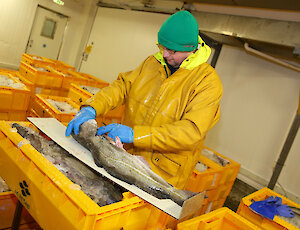Fisheries college brings huge benefits to Shetland economy

Any substantial further cut in financial support by Shetland Islands Council would undermine the important work the institution’s staff carry out for the fishing industry locally, nationally and internationally, they warned.
And given that fishing and aquaculture account for around a third of the local economy, such a move would also have a detrimental effect on employment.
“Without the NAFC Marine Centre, fishing in Shetland would simply not be the modern, forward-looking industry it is,” said Brian Isbister, chief executive of the Shetland Fish Producers’ Organisation.
“We have had to adapt over the years and the focus now is on producing high quality fish and shellfish for markets all over the world in such a way that future generations of fishermen will be able to do the same.
“The staff at Scalloway have been and continue to be integral to that process through applied and academic research, data collection, policy development and training for young people who want a career in the industry as well as existing fishermen.”
He added: “The founding purpose of the Centre was to support the industry locally, but it now does much more than that and has an excellent reputation not only in Shetland but beyond the islands, among scientists, civil servants and policy makers. It’s important that we build on that, not cut it off in its prime.”
The work carried out at NAFC Marine Centre for the fishing industry currently includes:
- Collection of information on so-called “data-deficient” whitefish stocks – including monk, megrim, lemon sole, hake and ling – which is provided to Marine Scotland Science and ICES, the scientific body that assesses fish stocks and suggests quota levels for different species across Europe.
- Sampling of fish and shellfish at markets and factories in Shetland on behalf of Marine Scotland Science to monitor size and age. This is part of national and international programmes. Length and age of landed fish are important parts of stock assessments undertaken by ICES on haddock, cod, whiting and saithe.
- Research to increase knowledge of megrim, particularly the biological and ecological factors behind its reproduction, growth and maturation. This work has led to papers being published in several academic journals and a PhD for the scientist behind it, Paul Macdonald.
- Support for the Shetland Shellfish Management Organisation (SSMO) in the form of data and advice. The Centre is unique in having 13 years of detailed data on shellfish stocks in Shetland. Without the data Shetland would not have secured world-first Marine Stewardship Council (MSC) status for its scallop, velvet and brown crab fisheries.
- Collection of shellfish fisheries data that is among the most detailed anywhere in Europe.
- A wide range of courses for those who want to get into or are already in the fishing industry on both the nautical and engineering sides.
Simon Collins, executive officer of Shetland Fishermen’s Association, said many of the projects carried out at the fisheries college were jointly funded by a range of organisations, including the Scottish Government, the association itself and the council.
“Through its activities NAFC is able to lever in funding from outwith Shetland for research – almost £500,000 last year alone,” he said.
“Many of these projects would be put in jeopardy by a funding source such as the council unilaterally pulling out. The Centre has already faced significant cuts to its budget. A major additional cut would undermine its capacity to carry out this vital work.
“The NAFC Marine Centre is a key part of the organism that is the fishing industry in Shetland – wrenching it away might seem like a neat solution but the fact is it would cause grave and irreversible damage to the community as a whole.”